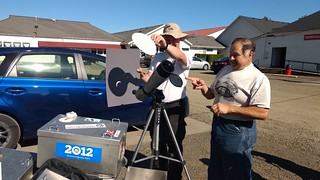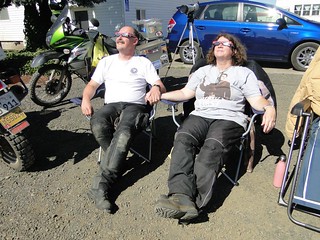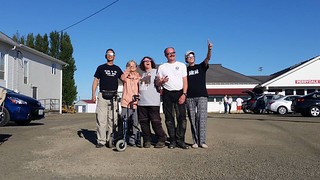Earlier this year, I found out that solar eclipse totality would happen in McMinnville, Oregon, just 25 miles away from where I live. That city would get 56 seconds of eclipse totality. I was excited about the solar eclipse already, but I didn't realize that a complete block of the sun would happen so close to where I live. So proposed that we - my husband and I - go down to see it on the day of the event, in parking lot somewhere in the city. We’d leave around 7 a.m., have breakfast somewhere, walk out, see the eclipse, and then leave.
But then the hype kicked in, and ramped up every week, both in terms of how the crowds would be and what totality would look like. I realized I wanted more than a parking lot: I wanted a beautiful place to see the solar eclipse, and I wanted a longer totality. And there was no way we could leave the house at 7.
I saw a partial solar eclipse in July 11, 1991 in Silicon Valley, California. It was one of the worst year of my life, but the eclipse was a highlight, even if I didn’t do any more to celebrate it than stick a pinhole in a paper plate and look at the shadow for a few minutes on the ground outside of the horrible place where I worked.
Partial eclipses are worth observing, but I was reading too many poetic posts from scientists about what totality would be to pass up the opportunity to see it.
Several weeks ago, we road our motorcycles through the backroads Northwest of Salem. We had been to Falls City last year, and had a look again to consider its candidacy for eclipse viewing, but I thought there were too many trees. We were afraid Dallas or Rickreal would be a zoo of traffic, that we would not be able to get even close to either town unless we camped the day before. As we went back to our home in Washington, County, we passed through tiny Perrydale, and I had an epiphany:
Perrydale, Oregon would be the perfect place to view the eclipse. It had open skies, nothing to obstruct the view of the eclipse, and there was plenty of parking. Back home, I looked up totality for the city on
the NASA eclipse web site, and found that
totality in Perrydale was predicted to be 1 minute 43.3 seconds - 47 seconds longer than McMinnville. Perrydale is 50 miles away from where we live. Dallas would give us an additional 13 seconds of totality, but, again, I was afraid it would be a parking lot before we could get near the town, even leaving in the wee hours of the morning.
Of course, we could have gone to Hopkinsville, Kentucky, my home state, and get more than two minutes of totality...
Beloved friends from California asked if they could drive up and join us, and we said yes, absolutely! It was actually my friend’s 87 year old mother’s idea - she came too, of course.
The night before the eclipse, we all were in bed (not the same bed) by 10 p.m., and I pushed everyone out the door so we could be on the road by 4 a.m. Because there would be HOARDS OF PEOPLE and we had to be ready for the tremendous traffic jam that, no doubt, would already be on state highway 47 heading to Gaston!
There was no traffic jam. There was no traffic at all, not even on 47. I pulled over in Yamhill and consulted with Stefan: based on the lack of anyone, we decided we’d dare to travel through McMinnville after all on our way to Perrydale. We continued on to Carlton, our motorcycles and our guests' car barely missing a live, confused possum in the road, and we turned on to 99... and there was still no traffic. None. I turned into a gas station in McMinnville to ask my traveling party if, indeed, the eclipse was
today.
We continued on to tiny Perrydale. There are no businesses in Perrydale, just a tiny elementary school, a small high school (they are right next to each other), and a church. The grandstands for the school football field could hold maybe 60 people. The town doesn’t have a post office. A blog from 2013 found by a member of my traveling party is entitled “
Perrydale, Oregon – Not quite a Ghost Town” and says the town has 60 residents.
After some exploration, we decided to
park and set up in the school parking lot, next to a Baptist Church.
It was cold outside, though far from freezing. As daylight set in, one of our party, Russell, my former sensei, walked around the school and came back with the best news we’d had all morning: the men’s restroom next to the athletic fields was open, clean, had toilet paper and had hand soap. Bathroom access had been my biggest worry about choosing this site. I almost did my happy dance, but decided to spare everyone.
We set up our camping chairs to face out to the sunrise, giving us
a view of a large farm field and anyone traveling through town on Amity-Dallas Road.
Another view of our view.
I felt like I was an idiot for making everyone get out of my house before 4 a.m. I kept apologizing. And I remained scared someone would come up out of no where and announce we had to move.
We had gotten there just after 5 a.m. After sun rise,
Stefan set up the telescope. Once it was truly daytime, Russell said I should do a “ditch check” to see if the ditch across the road before the field was too deep to cross - we’d been planning to cross the street and sit in the field if traffic got too thick. So I went over, had a check, and when I turned around to
look back at our little set up, I also looked back down the road we’d come, and saw a neon sign: open. On a coffee hut. COFFEE!! We’d brought coffee but, hey, coffee hut coffee?!? I’m there! So much for my comment that Perrydale doesn't have any businesses...
Gail (Russell’s wife) and I walked down and saw
a field of campers across from the coffee hut. So, we’re *not* alone… we’d brought coffee, but I didn’t have a big enough thermos to take more than enough for each of us to have one cup - and I mean a cup, not a big mug. I was SO happy to have good coffee!!
Later, we sat in our camping chairs, all looking at the sunrise and the field. I said, “This is unbelievable:
no traffic, a great viewing spot that has a clean bathroom with toilet paper, there’s not a cloud in the sky, there’s no smoke in the sky - this is AWESOME!” To which Russell replied, “Hey, isn’t that a professional massage therapist parachuting out of the sky and landing in the field right across from us?” To which Gail replied, “And doesn’t he also have wine, both red and white?”
It was a great morning. The four hours we sat there before the eclipse went SO FAST. We talked, we laughed, we ate coffee cake, we spied on a farmer working far in the distance… well into the morning, other people finally started showing up. One person told us that there was a traffic jam in McMinnville, mostly for the air and space museum there, when he had come through at 5:45 a.m. We easily could have still left our house 90 minutes, even two hours later, and made it to Perrydale in plenty of time for the eclipse. And I would have LOVED that extra two hours of sleep…
We contemplated movies and TV shows that feature an eclipse:
Ladyhawk,
A Connecticut Yankee in King Arthur's Court,
MadMen and
Heroes. The suggestion of
Day of the Triffods was withdrawn when I remembered that was a meteor shower, not an eclipse. And we though of songs featuring astronomical references: the obivous one everyone has been referring to,
Total Eclipse of the Heart, as well as
Bad Moon Rising, Black Hole Sun, and
Invisible Sun.
I talked Stefan into giving away his extra pair of eclipse glasses (I think he wanted to sell them) and, just after 9,
the eclipse began. We looked at it with our glasses, we looked at it via the projection from the viewer on Stefan’s telescope, I made jokes about the progress:
“Now, it looks like the sun is wearing a top hat and we can only see the bottom.”
“Now, it’s Pac Man, and he’s singing, ‘Woooooooo’”
“Now, Pac Man is singing ‘Ooooooooooo!’”
 People gathered around Stefan's telescope and took photos
People gathered around Stefan's telescope and took photos of the projection onto a paper plate and
onto a gray matte board that some other group had brought. Other than the solar eclipse,
he was a very popular photographic target as well.
There was now
a sizable group in the parking lot with us, though nothing overwhelming at all, and everyone was super friendly.
I ate some chicken and potato salad and started thinking about totality. As one does. What would it really be like? Several people on the
March for Science Facebook group said it was absolutely not to be missed, that it would be absolutely stunning. One guy said it was safe to take your glasses off during totality - it was mandatory, in fact. It would get so dark street lights would come on, and birds might stop singing. Stars would appear.
After 10 a.m, we all began to get anxious. Totality was coming! It was getting dimmer all around us, like sunset, except, the sun was right there above us, like always. Without the glasses, if you were foolish enough to look at the sun, you would have just seen a big light blob, like always. That's what ancient man, or medieval man, would have seen - the sun, as normal. Unless they understood the images they might be seeing on shadows cast by the trees, they wouldn't have known that an eclipse was happening, only that things were getting darker, and cooler. Gail put on a sweater. I kept commenting on how it looked like night was coming. We would look up at the sun, always with glasses, every 2-3 minutes, waiting to see how close we were getting, and watching things get grayer.
At 10:15 a.m., we were just two minutes away, and all eyes, behind eclipse glasses, were looking up. At 10:17, the last yellow sun beam disappeared behind the black moon, stars appeared, Stefan yelled, "Take off your glasses!", and I did, and I looked up and saw one of the most amazing things I've ever seen. Stars really did come out around the sun and moon. Night was descending. The sky was a million shades of dark gray and blue. The moment the last yellow sun beam disappeared behind the black moon, I saw pink beads within the corona, and long white, fuzzy glares coming out of the top and bottom of the sun behind the absolute black dot of the moon - but not in any symmetrical way. There was no yellow, just black and white and gray and pink and some blue. As Gail put it later on Facebook, "Totality Whoo hooo. We got a diamond!" I kept yelling "I can't believe this! This is amazing!" I was yelling, wooting, jumping up and down. When a yellow sun beamed appeared, glasses went back on, and day broke again, for a second time in just a few hours. We all clapped. I realized I was crying. Many of us hugged each other. We were astounded.
I found out later that the pink beads interrupting the corona of the sun come from the mountains on the moon. Yes, the mountains on the moon. When Galileo pointed out that the moon is an imperfect sphere, marked by mountains and valleys, he was imprisoned because of outrage by the Roman Catholic Church. I thought about all those early astronomers over thousands of year, trying to figure out the weather based on observing the heavens, how their observations lead them to uncover facts about the universe that were sometimes celebrated, sometimes derided. I also thought about the first humans that saw totality and how must have shuddered in terror, not understanding what was happening.
Science got us here, to this point of celebrating what physicist Michio Kaku called a cosmic coincidence, the fortuity that the moon is just the perfect size and the sun is just the perfect size and the moon and the sun and the Earth are all just the right distance from each other such that we get this eclipse that shows the sun's corona. Science predicted this eclipse, down to the second, for different parts of the world - not some preacher or physic. And they've been predicting them accurately for hundreds of years using
science.
NASA asked on its web site, "What was your experience? How did you feel? Let us know what the eclipse meant to you in 6 words." And they asked, if you shared it on Twitter, to tag your comment with
#Eclipsein6. Here are my tweets:
I felt connected to ancient astronomers.
Saw pink beads around the moon.
Cried at the beauty. Celebrated science.
Said repeatedly, "I can't believe this!"
Yelled "Everyone, take your clothes off!"
Yes, really. All that. The "get nekkid" comment drew a LOT of laughs...
Cars started heading past us just after our celebrations of totality. Stefan went back to telescope projections. I went back to my glasses. We also
waved at the now steady stream of cars going passed us. We ate some more, talked about how we would all get back to our homes. My guests would be leaving to head South straight from where we were. We would be going in the opposite direction.
Gail started checking GoogleMaps and started seeing traffic jams everywhere. We weren't seeing a jam, but there sure were a lot of cars going by... We dawdled, hoping that we were letting the worst of the traffic get to wherever it was going. We were almost the last to leave our site, at about 12:15. Stefan decided it would be best that we go 77 miles out of our way, back through Sheridan and Willamenia, up into the mountains via oh-so-curvey Gilbert Creek Road, over onto NW Bald Mountain Road, down to Nestucca Road and back to Carlton. We preferred to take an extra 90 minutes of riding to just sitting in traffic in the hot sun in McMinnville. We had to make a left onto 18, and I gasped when we got to the intersection: it was a wall of never-ending traffic coming East on the highway, and some drivers going the opposite direction. And no light at the intersection. And people on the opposite side also wanting to make a left turn, which put us in each other's way. And we had no right of way. Somehow, we got across - I still don't know how. The road up into the mountains was fine, though I was really tired and went slower than I would have liked to. Once we finally made it to Sheridan Peak, a scenic lookout with a large parking lot and a pit toilet that overlooks the valley, I was in dire need of a break. There were two guys there that had camped at the overlook and seen the eclipse, and one of them gave me all the coffee he had left, half a cup. He's my hero. We met some German-speaking bicyclists and dawdled for almost an hour, hoping traffic was getting better.
We got to the intersection for Carlton and there was a MASSIVE, never-ending line of cars waiting to turn into the town. Luckily, it was a four-way stop so we got to go rather quickly. For the next 12 miles, on state highway 12, we went between 5 and 30 miles an hour. The 20 minute drive took well more than an hour. Oh, well, if I had to finally have my solar eclipse traffic jam, I preferred it now, after the event.
We got home at 3:30, and found out that was lucky - that evening, there were still people trying to get home on the clogged roads.
So, that's my eclipse report, in a sea of eclipse reports. What an absolutely amazing experience. So much so that we're already planning for April 2024.
Our photos from the day.
And added bonus:
Gail's 87 year old mother, on video, talking about this, her third eclipse.











